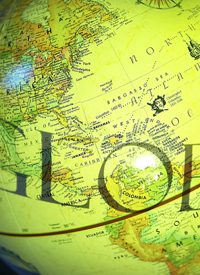
During a conference in Singapore this week, delegates to the Interpol-United Nations meeting agreed: the budding global police force needs more power.
According to reports, the international group is aiming to step up its efforts to battle crime worldwide, claiming the need for its own special passports, shared global DNA and biometric information databases, cooperation with the UN’s military arm and much more. “It is the first step toward creating what Interpol calls a ‘global policing doctrine,’” reported the New York Times in an article entitled "Interpol and U.N. Back ‘Global Policing Doctrine.’’’
“As the world’s largest police organization, Interpol needs to remain at the forefront of all activity which enhances member country security and safety,” explained Interpol President Khoo Boon Hui. The organization — officially known as ‘THE INTERNATIONAL CRIMINAL POLICE ORGANIZATION – INTERPOL’ — is comprised of more than 180 member nations, including a wide array of repressive regimes like China, Iran, Saudi Arabia, Cuba, Sri Lanka (which is currently operating concentration camps), and even Zimbabwe. It was originally founded in 1923 and is based in Lyon, France.
The government ministers and high-level police representatives in attendance endorsed a special declaration that would create a “roadmap” for international police to fulfill their “full role” in so-called “peacekeeping challenges,” an Interpol press release explained. The UN already has over 12,000 civilian law-enforcement officers deployed around the globe.
“The police will be trained and equipped differently with resources,” said Interpol Secretary-General Ronald Noble, known as the “Enforcer” for his role in the infamous Waco siege, murders, and subsequent coverup in his position as Undersecretary of Enforcement at the U.S. Treasury. “When they stop someone, they will be consulting global databases to determine who they are stopping.”
The group also began issuing its own passports on Tuesday, aimed at eliminating visa requirements so global cops can get anywhere quickly. “That a person is traveling with an Interpol passport for official business should be all the information a country needs in order to grant them access,” explained Noble, the first American to head the organization. “By agreeing to waive visas, member countries will ultimately be assisting themselves.”
The conference opened with a speech from the Prime Minister of Singapore, Lee Hsien Loong, a strong supporter of the new measures being pushed to empower the agency. “While military forces are indispensable for establishing initial security, civilian police forces are more suited for law and order tasks and for maintaining security,” he said. “Only by working together can we effectively tackle trans-national crime and terrorism.”
News reports promoting the new agreements touted alleged Interpol successes, such as the arrests of some 1,300 people across various Asian countries in an illegal soccer gambling operation. Other agency responsibilities include operations involving drugs and stolen passports. UN Secretary General Ban Ki-moon welcomed the news of increased powers, adding: “They forge trust in uniformed men and women.”
But critics have pointed out that the global cops have no allegiance to the U.S. Constitution and are, in fact, subject to their own constitution which bears little resemblance to the Supreme Law of the Land in America. For instance, Article 2 established the agency’s aims: “To ensure and promote the widest possible mutual assistance between all criminal police authorities … in the spirit of the ‘Universal Declaration of Human Rights.’” The UN’s declaration of privileges essentially states that individuals do not have rights, though it purports to grant a few “freedoms.” According to Article 29 of the UN document: “Everyone has duties to the community,” and “these rights and freedoms may in no case be exercised contrary to the purposes and principles of the United Nations.”
Further empowering a global police force, especially without the constraints of the U.S. Constitution, is a very dangerous proposition. The UN does not acknowledge God-given rights or even rights superior to government. Of course, tyrants would like nothing more than the assistance of other tyrants in tracking down enemies of their regimes — yet another reason to carefully consider the implications of this push for more authority.
Congress should withdraw U.S. funds and assistance from these organizations immediately. In fact, ditching Interpol and the UN is long overdue. Collaboration with the various rogue and oppressive regimes of the world is not something U.S. taxpayers should be forced to support. And the day global cops can detain Americans in the United States without cause to “determine who they are stopping” is the day America officially exists no more.



